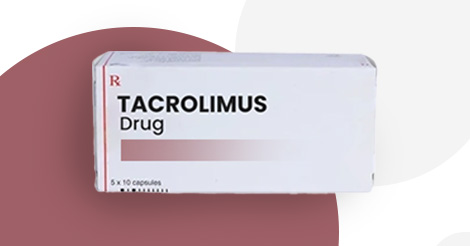Is Tacrolimus the Choice of Drug For You?
Humans are researching and finding new ways to lead a happier and healthier life. Due to medical advances, the overall life expectancy has increased over the years. Organ transplant is another way to increase the life span. Since these are artificial procedures and techniques, a lot of medical support is required. Specific medicines are beneficial when these procedures are conducted.
When a patient receives an organ transplant, the body’s white blood cells will try to get rid of (reject) the transplanted organ. Some medicines suppress this response from the body, these are known as immunosuppressants. Tacrolimus is one such medication. It works by suppressing the immune system to prevent the white blood cells from trying to get rid of the transplanted organ.

What is Tacrolimus?
Tacrolimus belongs to a group of medicines called as immunosuppressive agents. Tacrolimus is an immunosuppressive drug whose preliminary use is after an organ transplant. It reduces the activity of the patient’s immune system and the risk of organ rejection. Tacrolimus is a calcineurin inhibitor. It is beneficial to prevent organ transplant rejection and treat moderate to severe atopic dermatitis. Tacrolimus is used together with other medicines to prevent the body from rejecting a transplanted organ (like the kidney, liver, heart, or lung). This medicine may be used with steroids, azathioprine, or mycophenolate mofetil. It is also used the treatment of severe atopic dermatitis, severe refractory uveitis after bone marrow transplants, and the skin condition vitiligo.
What is Tacrolimus given for
Tacrolimus belongs to a class of drugs known as topical calcineurin inhibitors (TCIs).
Tacrolimus is beneficial in the following cases and is prescribed by the doctor.
For patients with Eczema. Eczema is a skin condition. You can see red, irritated, and itchy skin, with an allergy type reaction. Tacrolimus is used on the skin for this (atopic dermatitis) in patients who have not responded well to other eczema medications.
The primary job of the is to cause weakening of the skin’s immune system, thereby reducing the allergic reaction and help relieve eczema.
In organ transplant patients. Tacrolimus suppresses your body’s immune response, thus helping your body to treat the new organ as your own and accept it.
It is given to reduce the production of chemicals like histamine that cause allergic eye symptoms such as inflammation.
Tacrolimus is not recommended for patients having a history of a certain rare genetic disorders like Netherton’s syndrome. Also, this medication should not be used by anyone who has a weakened immune system.
How is Tacrolimus available?
Tacrolimus is sold under the following brand names:
• Pangraf (Panacea Biotec Ltd)
• Tacroz (Glenmark Pharmaceuticals Ltd)
• Tacrovera (Alkem Laboratories Ltd)
• Takfa (Intas Pharmaceuticals Ltd)
• Tacromus (Zydus Cadila)
• Tacrotor (Torrent Pharmaceuticals Ltd)
• Tbis (Biocon)
How is Tacrolimus taken?
• It is to be taken on an empty stomach in the morning, at least 1 hour before or 2 hours after a meal. Although it is best advised to be taken without food, patients who suffer from stomach problems can take it along with a meal.
• Take it at the same time every day.
• Swallow the tablet whole. Never chew it or crush or break it.
• Tacrolimus Ointment is used on the skin only.
• Avoid getting this medicine in your eyes, nose or your mouth. In case of any accident, it is important to flush it with lots of water.
• Never put this medicine on infected areas or wounded areas.
Dosage
The dosage depends on the patient. The weight, overall health, and the results of the blood tests done.
For oral dosage form (capsules, granules):
• To prevent heart, kidney, liver, or lung transplant rejection: In adults, the dose is based on the body weight and must be determined by your doctor.
• The starting dose is usually 0.075 to 0.3 mg/kg of body weight per day, divided into two doses, and is recommended to be taken every 12 hours.
Precautions
This product may contain inactive ingredients, which can cause allergic reactions or other problems. Before using this medication, tell your doctor your medical history, and any allergies you may have.
• Inform about any swollen lymph nodes (for example, due to lymphadenopathy, mononucleosis),
• Any history of use of light therapy (such as UVA or UVB)
• Any skin infections like herpes or shingles)
• Any other skin conditions you may have. Or if you have skin cancer.
• If you have any kidney disease.
• Limit alcoholic beverages, as this medicine may make you more sensitive to it. Your skin may feel hot or get hot flushes.
• Avoid spending too much time in the sun as this medication has a tendency to make your skin sensitive to the sun. Avoid tanning booths and sunlamps. Sunscreens are a must. Ensure that you wear proper clothes when outdoors. If you get sunburns or have skin redness, inform your doctor right away.
• During pregnancy, this medication should be used only when advised by the doctor and only when needed.
Always be careful and discuss the risks and benefits with your doctor.
Adverse effects of Tacrolimus
Tacrolimus is a very strong medicine. It can cause side effects that can be severe such as kidney problems. It may also decrease the body’s ability to fight infections. You and your doctor should talk about the benefits of this medicine as well as the risks of using it.
Common side effects of Tacrolimus
• The increased glucose level in the blood
• Insomnia (difficulty in sleeping)
• Increased potassium level in the blood
• High blood pressure
• Renal toxicity
• Neurotoxicity
• Gastrointestinal disorder
• Diabetes
• Infection
• Decreased appetite
• Electrolyte imbalance
• Fluid overload Blood cell abnormalities
Other side effects of Tacrolimus
• Stinging, burning, soreness, or itching in the area of treated skin (this may be seen during the first few days when the treatment begins)
• Headache
• Acne or folliculitis (small red bumps)
• A stomach upset
• Some flu-like symptoms (such as fever, chills, runny nose, sore throat, and muscle aches)
• Increased sensitivity of the skin to hot/cold/pain/touch may also occur.
How to know if Tacrolimus suits you?
Did you know, genes play an important role in our lives? Genes are the reason why some medicines may work for your friend, but may not bring in the desired results for you. Genes are also responsible that some people experiencing severe side effects and some do not show any. Traditionally the doctors prescribe a drug and study the response from the patient. The dose is altered accordingly.
Today MEDNAwise pharmacogenetic testing has made it easy to know which drug will be the most effective and bring the best results. With MEDNAwise the doctors know which drugs are best suited for you. MEDNAwise helps forecast your genetic response to 70+ drugs used in diverse medical specialties. MEDNAwise test can tell you which drugs and dosages may be the best for you. It is beneficial to find out if you will have serious side effects from medicine. MEDNAwise is helpful to know your response to Tacrolimus.
Moreover, MEDNAwise is a simple spit swab test and does not require any elaborate preparation. You can take this test from your home and send the samples for testing. MEDNAwise pharmacogenetic testing is an important stepping stone toward the future of personalized targeted medicine and therapy. It has improved healthcare worldwide. Why are you waiting? MEDNAwise is affordable, accessible, and easy. The counsellors from Indus Health Plus also assist you after the results are out. You can take informed decisions with MEDNAwise and lead a healthier and happier life. Book a test today!
Get In Touch with Our Health Expert
Why Choose Indus Health Plus?


